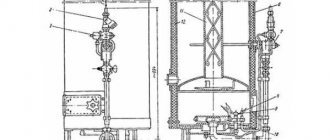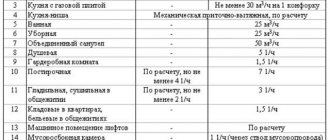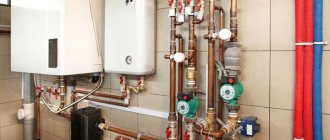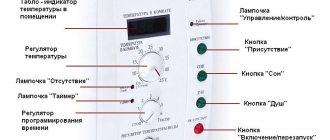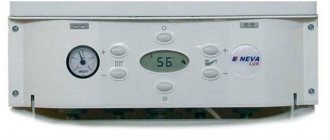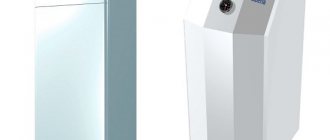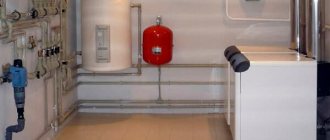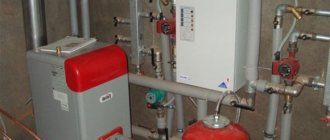In 99.99% of cases, a client buying a gas boiler wonders about its consumption. Piously relying on the “expert calculations” of sellers and trusting them, sometimes you often get burned. Some clients who hear more realistic numbers from us run to the place where the number was lower and still buy a boiler there. So, don’t end up in a field of lies and find out a more detailed figure for gas consumption in order to understand whether you should buy a boiler or not. This is why this article was created.
The bitter truth about gas consumption in your home
Now you may be surprised, but not a single person will be able to tell you the gas consumption of the boiler in the case of your home. When performing calculations, an experienced specialist will be able to give average values that will be close to the truth, but in any case they will not reflect the exact essence.
This is due to several factors:
- Winter is different from winter every year. Accordingly, the warmer it is, the less will be spent and vice versa.
- 100 square meters in your house and 100 square meters in your neighbor’s house are two completely different houses. Below we will talk about why
- Different boilers have different flow rates
Cost of floor-standing gas boilers
Another important selection criterion is the price of the device. Condensation models are an order of magnitude more expensive than convection models. It is better to purchase a boiler that can operate on both natural and liquefied fuel.
Basically, devices in the affordable price category include models with low efficiency. More efficient units, especially foreign-made ones, are more expensive.
Lifespan of a gas boiler: selection rules and specialist recommendations
Find out which boiler is the most economical
If you can’t afford condensation-type heating devices, you can purchase a cheap domestic boiler with low fuel consumption.
Factors affecting gas consumption
There are three factors that affect gas consumption in your home:
- Heat loss. Each house has its own amount of heat loss and in each unit of time the heat loss of the house is different. They are often calculated based on the lowest temperature values in your region. Calculating them is quite simple. The Internet is full of ready-made calculators. Losses in a house are influenced by a lot of factors: thickness and materials of walls, insulation, windows, doors, ceilings. Simply put, absolutely everything affects losses
Heat loss is measured in kilowatts, as is the boiler power. As you already understood, the boiler power is selected based on the amount of losses.
- The heating system itself. Whatever one may say, if your heating system is not thought out and balanced, then excess consumption will also be observed. Not as significant as with heat loss, but it will still happen. In this case, usually there will be overheating in some rooms, and underheating in others.
- The boiler itself. Depending on the type of boiler, gas consumption also depends. Floor-standing boilers consume more, wall-mounted boilers consume less.
Approximate calculation of gas consumption
So, let’s say you’ve already calculated the heat loss at home. If not, then for most regions a rough value of heat loss of 100 W per 1 square meter is taken. m. Let's say our house has losses of 10 kW and we need to find out how many cubic meters per hour our boiler will consume. To do this, we need to understand how much heat we can get from one cubic meter of gas.
According to GOST, 9.3 kW of thermal energy can be obtained from one cubic meter of gas. Ideally, with 100% boiler efficiency and heat loss of 10 kW, we will spend 0.93 cubic meters of gas per hour.
And now why this calculation can be called the most inaccurate. Even if the gas complies with GOST, the performance of the boilers is different. A traditional wall-mounted boiler has an efficiency of 92-93%. Therefore, another 8% must be subtracted from 9.3 kW. This will be a more accurate figure.
Another thing is that we calculated the maximum flow rate at the lowest temperature. But this temperature does not always happen. It may be warmer today, colder tomorrow. And the losses will be different. Therefore, from here you can take some average value and you will get the most pessimistic gas consumption figure.
It’s simply impossible to accurately calculate something. (Of course, if you want to conduct a static analysis of temperature measurements in your region over a hundred years, find dependencies and compare everything, then a more accurate calculation will be obtained. But it’s better to stop even thinking about it.)
Efficiency and efficiency of the boiler
The passport for any gas boiler indicates its efficiency - coefficient of performance. This figure starts at approximately 90%. It is believed that the higher this figure, the more efficient the device is and the more economical it is. In practice, such an assessment of the boiler does not correspond to reality. For modern gas units, the efficiency is approximately at the same level, on average from 91 to 95%. The highest efficiency is achieved by condensing boilers, in which this parameter reaches 98%. Therefore, a difference of several percent should not be considered a priority in choosing an economical gas boiler. Efficiency is more influenced by other characteristics.
There are two types of gas boiler designs: convection and condensation. The first are traditional classical units, the efficiency of which is more than 90%. But the fact is that part of the energy is lost along with combustion products. Condensing boilers are more advanced in this regard.
Which boiler uses gas more economically?
Condensing wall-mounted boilers are considered the most economical today. Their productivity is close to 100% due to the extraction of additional heat from the formed condensate. Another thing is that such boilers are economical only with low-temperature heating systems. These include, for example, water heated floors. In other cases, such a boiler will work like a traditional one.
In second place you can place traditional wall-mounted boilers with a closed combustion chamber. Their productivity is already 90-93%. At the same time, productivity does not depend on external factors.
In third place are floor-standing boilers. Here the difference in productivity is from 50% to 90% (It is true that it is rare that a manufacturer writes honestly about the low efficiency of their boiler). Plus, such boilers are draft-dependent. Therefore, they require a complete, properly installed chimney.
Traditional boilers vs condensing boilers
Each of the two types - condensing and convection devices - uses different technologies for heating. A classic boiler (convection) burns fuel. It subsequently heats the heat exchanger with circulating water. There is quite a lot of energy left that the device cannot use. And it is removed through the chimney. Therefore, the efficiency of such devices does not exceed 90%.
Condensing technology works differently. The design provides for the presence of two chambers. In the first, gas is burned, in the second, the resulting excess energy is condensed on a heat exchanger. Thanks to condensation, the temperature of the heated water that is supplied to the system increases.
On the one hand, condensing models have high efficiency, thereby saving resources and money for the owner. On the other hand, one must take into account the high cost of such equipment.
To withstand chemically active condensate, equipment must be made of durable and high-quality materials. This increases the price of it. In addition, it will be necessary to install additional devices that will neutralize the condensate. After all, it cannot simply be poured into the public sewer.
Condensing boilers work best in combination with heated floors. In this case, the water temperature usually heats up to an average of 35 degrees.
If only radiators are used for heating, a temperature of at least 50 degrees is needed. But the process in this case will not be so effective, because the heated water upon contact with the heat exchanger will not release as much condensate. And the efficiency will not be high enough.
How to reduce gas consumption?
If suddenly your gas costs do not suit you, then the following recommendations will help you optimize them:
- Start insulating your home. The better you insulate your house, the less heat you will lose to the street.

- Check windows and doors for possible cracks. A lot of heat is lost through such structures
- If you use an open heating system with a tank on the roof, then convert the heating system to a closed one. A significant amount of heat is also lost through the roof.
- If you have a simple floor-standing boiler, then replace it with a wall-mounted one. Costs can also be reduced by 10-30%.
- Have your heating system serviced. Sometimes this can also have a positive effect on gas consumption. This is especially true for the boiler itself.
What's the result?
But in the end everything is simple. If you want less gas consumption, take a wall-mounted gas boiler. If you want to know the gas consumption in your home, ask your neighbor. If you want not to spend money and pay little for gas, then you are unlikely to succeed. Unfortunately, the reality is that everything good related to heating is quite expensive.
Characteristics in the rating
| 1 | BAXI Duo-tec Compact 1.24 | High efficiency. Weather-compensated automation |
| 2 | Vaillant ecoTEC plus VU INT IV 306/5-5 | Actual annual savings of 20%. Modulating burner |
| 3 | NAVIEN GA 35KN | The most economical powerful boiler |
| 4 | Buderus Logamax U072-24 | Copper heat exchanger. Ease of operation and maintenance |
| 5 | Lemax Premium-10 | The best single-circuit boiler |
| 1 | ACV E-Tech S 240 | The most economical double-circuit boiler |
| 2 | Vaillant eloBLOCK VE 12 | The most economical single-circuit boiler |
| 3 | EVAN Warmos-IV-9.45 | Restyled model with automatic power mode selection |
| 4 | Protherm Skat 6 KR 13 | Intelligent connection of heating elements |
| 5 | ZOTA 9 Lux | The best ratio of price and functionality. Availability of chronothermostat |
When installing a heating system in a house, owners are guided by a number of factors. This includes the availability of communications, the price for the heat source, the climatic conditions of the region, the safety of operation, etc. At the same time, it is important to remember about efficiency so as not to throw money down the drain during the cold season. It should be noted that even the most economical boiler will not save the owners if the house is poorly insulated and the heating system is poorly designed. When choosing a heating device, the price of the boiler often becomes the main factor. But immediate benefits can result in serious expenses for gas or electricity. Gas and electric boilers can provide a modern home with heat and hot water in autonomous mode. How to choose the most economical option?
- In populated areas where there is a gas main, it is economically feasible to purchase gas boilers. At the first stage of purchase and connection, home owners will have to face serious investments. The boiler itself will cost a tidy sum, but most of the time, nerves and money will have to be spent on designing and supplying a gas pipeline to the house. Additional funds will be needed to create effective ventilation and organize space in the boiler room in accordance with regulatory documents. Frequent uninvited guests will be gas workers and firefighters. But in the future you will be able to save a lot when heating your house during the heating season.
- Not everywhere near the house there is a gas main. In this case, you have to choose alternative heat sources. One of the simplest and safest ways to heat a house is to use electric boilers. Since electricity is available in most populated areas, the homeowner will only have to choose a device with optimal power and efficiency.
When calculating, you should use a simple formula. It is generally accepted that 10 square meters are needed for heating. m of a house with a height of 3 m requires 1 kW of energy. Therefore, for country houses with an area of up to 100 sq. m. an electric boiler with a maximum power of 10 kW is suitable. It’s better to have a small reserve of a few kilowatts, but you shouldn’t get too carried away either. Due to frequent switching on and off of the boiler, not only will the load on the heating elements increase, but also the electricity consumption will increase. To roughly calculate how much heating with electricity will cost, you should determine the average daily operating mode of the boiler. To do this, the power of the device is multiplied by the number of hours of continuous operation and divided by 2. This figure is multiplied by 30 days, and then by the number of months of the heating season. All that remains is to find out the electricity tariff and multiply by the resulting consumption. The percentage of error depends on the vagaries of the weather, but usually it does not exceed 20% of the calculated value.
Our review included the most economical gas and electric boilers. The rating was compiled based on an analysis of technical characteristics and taking into account reviews of compatriot homeowners.
The most economical electric boilers
Electric boilers are also quite popular. They can be a good choice for regions with mild climates. The advantages are compactness, safety and environmental friendliness. But when purchasing, you should make sure that the network will handle the additional load - some weak transformers, which are found in many villages, may simply fail because of this.
1. Protherm Slope RAY 9 KE /14 9 kW single-circuit
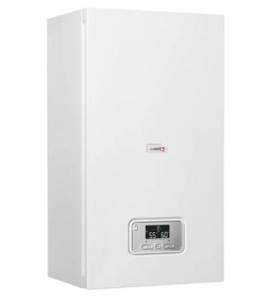
Simply an excellent energy-saving boiler, the main advantage of which is its very high efficiency - as much as 99.5%, which very few models can boast of. Many users appreciate its compactness and lightness - the weight is only 24 kg, which makes it possible to install the boiler on the wall. If desired, you can connect external control to make the setup process and timely startup even easier and more comfortable.
The built-in expansion tank is an important part of any heating boiler. The larger it is, the lower the risk that the system will be damaged during frost.
The boiler has protection against overheating and freezing. Automatic diagnostics makes it easy to identify any breakdowns, even the most minor ones. And the built-in pressure gauge, thermometer and power-on indication make working with the boiler as comfortable and easy as possible. Of course, there is an expansion tank - as much as 8 liters. The power is easily adjustable from 3 to 9 kW, so you can adjust the heating system according to the outside temperature. To date, about a quarter of a million of these boilers have been purchased in Russia, which is an excellent indicator.
Advantages:
- highest efficiency;
- high-quality, European assembly;
- compactness.
Flaws:
- quite high price.
EVAN EXPERT 9 single-circuit
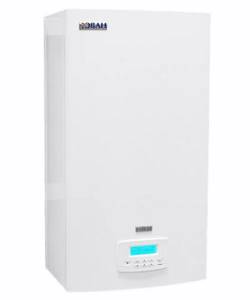
Users who need a reliable, simple and easy-to-use heating boiler will certainly not be disappointed with this model. Its maximum power is 9 kW, but if desired, you can set the desired level from nine available. The coolant can have a temperature from 10 to 85 degrees Celsius, so even a very cold building can be heated to a comfortable level in the shortest possible time. Thanks to its efficiency, it will be a good choice for medium and small houses - up to 90 square meters. Many users like that the kit also includes a display and an outdoor temperature sensor - this makes it possible to quickly change the power to avoid serious changes. Automatic diagnostics make it easy to find and fix breakdowns, and the ability to connect a heated floor attracts many users.
The boiler is equipped with outdoor and indoor temperature sensors - for most analogues you have to purchase them separately, spending a lot of money.
Advantages:
- easy to install and maintain;
- nine power levels;
- good functionality.
Flaws:
- Not very good build quality.
3. Vaillant eloBLOCK VE 12 12 kW single-circuit
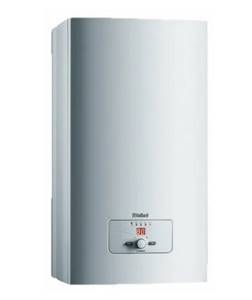
Experienced users are looking for not only economical, but also truly durable space heating equipment. They will definitely be pleasantly surprised by this model. Its main advantages include its significant service life - it is as much as 10 years! The warranty period also does not disappoint - 900 days. Therefore, the boiler deserves a place in the ranking.
Even compared to other compact electric boilers, this one stands out. It has two power levels - 6 and 12 kW. Therefore, you can choose the most suitable mode for the outside temperature. The boiler is equipped with a circulation pump, which significantly increases the rate of heating of the rooms - within a few minutes after starting the heating, the rooms will become noticeably warmer. Equipped with a 10-liter expansion tank, which eliminates the possibility of damage to the heating system in severe frosts.
Advantages:
- light weight;
- built-in circulation pump;
- significant service life.
Flaws:
- only two power modes.
ZOTA 12 Lux 12 kW single-circuit
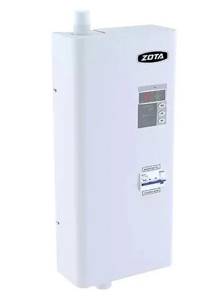
Transporting and installing a heating boiler is quite a troublesome job. It is not surprising that many buyers prefer the most compact models, especially if they are also quite powerful. That is why this model is very popular - its weight is only 18 kg. This does not prevent the boiler from having a fairly high power - 12 kW, which is quite enough to heat a house up to 120 square meters. Three power levels make it possible to choose the mode that is best suited for certain conditions, so as not to waste electricity. Electronic control greatly facilitates operation of the boiler and fine tuning. Additionally, operation is simplified by a display and temperature sensors – room and outside.
Among the useful functions is weather-dependent regulation - the boiler independently adjusts to the outside temperature in order to maintain the temperature at the proper level.
Advantages:
- ease;
- high power;
- ease of use;
- affordable price.
Flaws:
- Not all models can boast of high-quality assembly.
Expert advice on modern heating boilers
Practicing scientists recommend the following formula for calculating energy consumption. For 10 sq.m. The premises require about 1 kW of boiler power, which consumes 0.112 cubic meters of gas. Therefore, for a house with an area of 100 sq.m. in the cold season, 1.12 cubic meters are required every hour. energy carrier, and per day - about 15.5 cubic meters when the burner operates 14 hours a day. Based on these calculations, monthly consumption will reach 470 cubic meters. gaseous fuel. These are approximate calculations that may vary based on the level of insulation of the home and the maintained temperature in the house.
A new word in heating is gas condensing devices, in which the gas consumption of the boiler is reduced by 30% by using the principle of obtaining additional energy from the heat of flue gases by condensing them. The efficiency of such boilers exceeds 100%.
How to choose an economical and efficient gas boiler
Automated gas boilers made in Italy and Korea are considered the most technologically advanced and modern. These are wall mounted units. They are small in size, varied in design and equipped with an automatic control system.
Using built-in automation, the home owner adjusts the water temperature of the heating system and hot water separately from each other.
It is possible to set the heating switch-on time, which saves gas when there is no need to constantly maintain the same temperature level in the room.
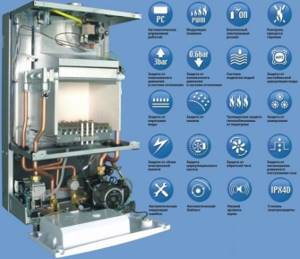
Modern automated gas boiler.
Before buying a gas heat generator, consider the properties of the room that needs to be heated:
- heated area;
- ceiling height;
- sizes, number and location of windows;
- insulation of walls and roof.
Choose a gas heat generator with a power reserve. This way it will not operate at full capacity and will last longer, which will reduce the cost of repairs and the purchase of a new unit.
Using the video below, you will learn how to choose a powerful heat generator.
Economical heating is a high-quality, economical boiler and a properly installed and configured heating system. If the house is well insulated from the cold, and all heating equipment works in unison, it will be warm and comfortable.
